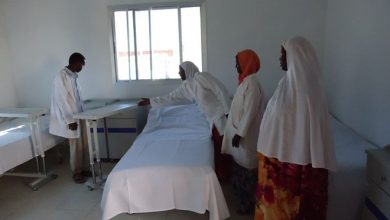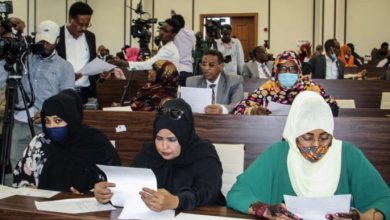No doctor, school, or water in Somali village disappearing under sand dunes
Every morning Mohamoud Jama Farah, a Somali fisherman, goes outside with a spade to dig away the sand that has piled up overnight around the walls of the family’s two-roomed house in the village of Kulub, near the coastal town of Garacad.
Every morning Mohamoud Jama Farah, a Somali fisherman, goes outside with a spade to dig away the sand that has piled up overnight around the walls of the family’s two-roomed house in the village of Kulub, near the coastal town of Garacad.
Mohamoud says he is contemplating moving his family of six out of the village, which is being smothered by the growing sand dunes.
The sand, blown in from the Indian Ocean, has buried people’s homes, covered water wells, and closed the local school and the only health centre in this small village in Mudug.
“The sand has buried homes and disrupted the daily livelihood of the village. There are no schools and no health centres. If a woman goes into labour now, there is nowhere to take her. The road is impassable for vehicles.”
We used to get water deliveries from a well in Garacad town. But now the water trucks can’t pass along the road,” Mohamoud said.
A few truckers manage to bring water to the village using a longer route, but they pass on the additional transportation costs to the customers through much higher water prices.
The only doctor in the village, who was running the local health centre managed by Puntland’s ministry of health, has also moved away with his family to Garacad.
Most of the houses in Kulub, including Mohamoud’s, were built with the support of aid agencies following the destruction of the village by huge waves caused by the Indian Ocean Tsunami in 2004.
Fishing is the main source of income. But the blocking of access roads to the village has caused food prices to skyrocket.
“The money we make from the little fish we catch is not even enough for dinner! Food prices have inflated enormously, as we buy foodstuff from Garacad town,” complained Mohamoud.
Another local fisherman, Yasin Abdullahi, sent his wife and seven children to stay with his father-in-law in Jariban, the main district town 50 kilometres inland, after fighting a losing battle with the sand encroaching around his house.
“I used to sleep outside the house every night alone. The sand has piled up on the walls and at the door of our home. I used to dig it out every morning, but finally when the roads were cut off, I sent my family away because they couldn’t survive here,” he said.
Yasin said he sends money occasionally to his family and stayed behind to look after the house and property.
Meanwhile, Mohamoud called on the local and federal government and aid organisations to help the villagers removing the sand dunes.
“The only tools we have are spades, but tractors are needed to shift the sand,” he said. “There is hope here, but we lack the effort from those in power. People in cold countries are able to excavate ice from the streets of their towns, so this is very small in comparison! We urge the government and the authorities to help us remove the sand dunes from our village.”
The commissioner of Kulub, Abdi Yusuf Karshe, told Radio Ergo that 130 of the 300 families residing in the village have already moved away to Garacad. Those remaining are mainly poor families who cannot afford to leave.
Garacad is a major centre for the fishing industry, where construction of a port is underway by private investors, with the approval of the Puntland government, aiming to open up central Somalia for trade with the outside world, especially the Gulf countries.
“As the authorities, we have raised our concerns with the local government who are yet to respond. We have been asking the families in the village to dig away the sand dunes. We are calling on the authorities and the aid agencies to assist the families, as the situation is deteriorating,” the Kulub commissioner said.





